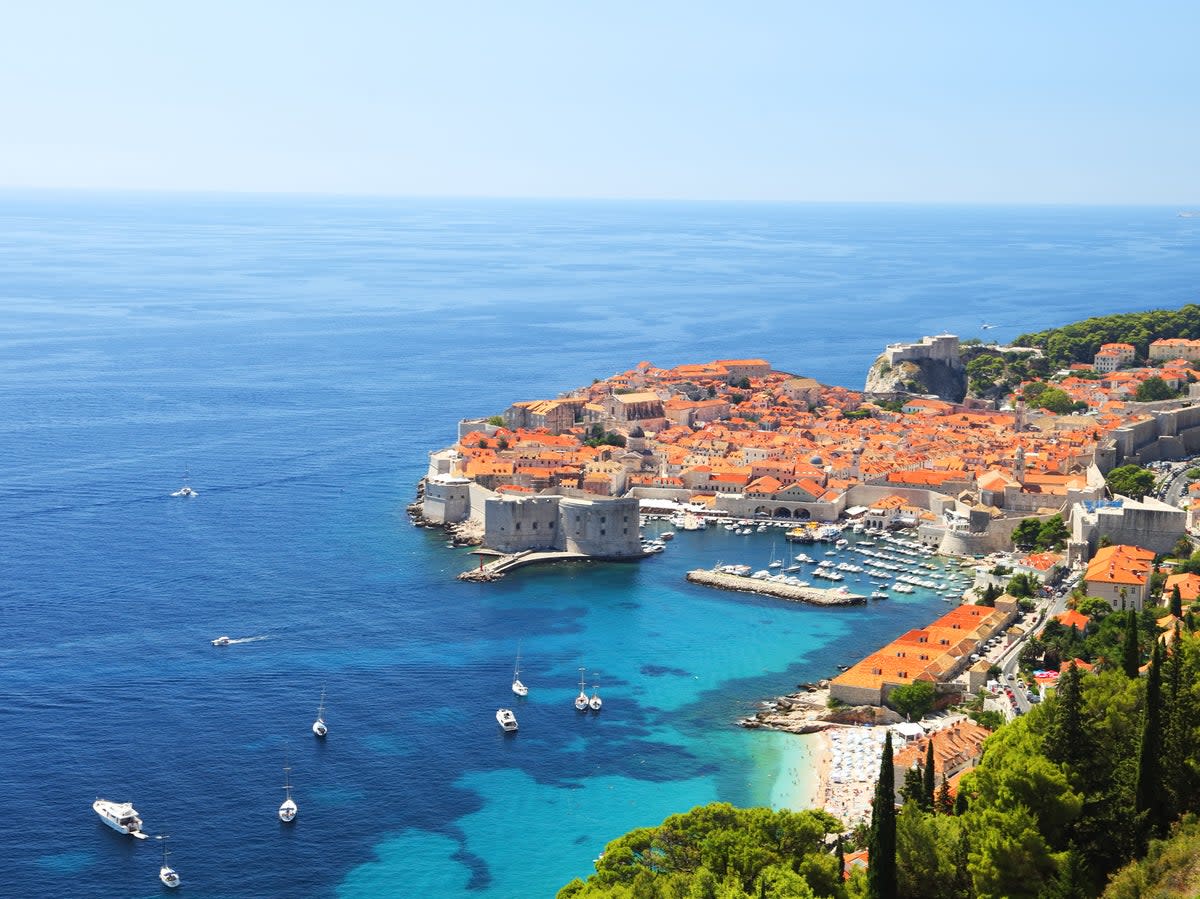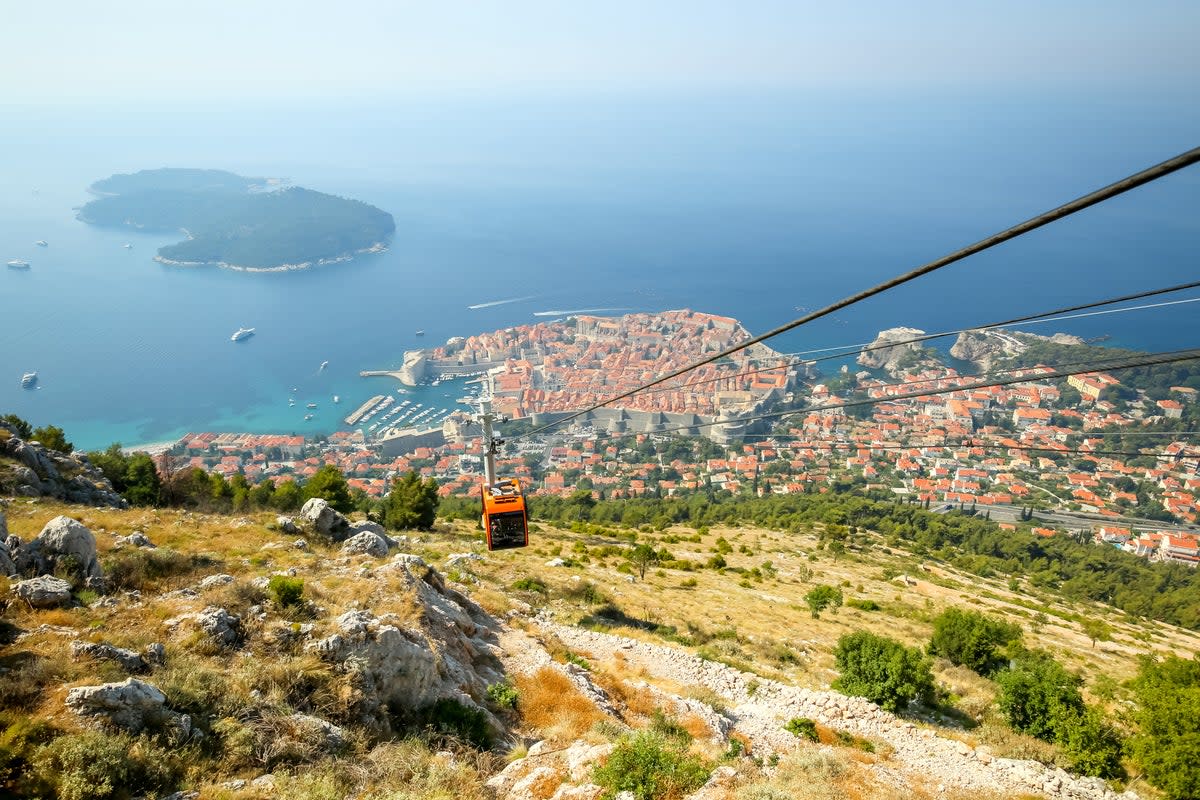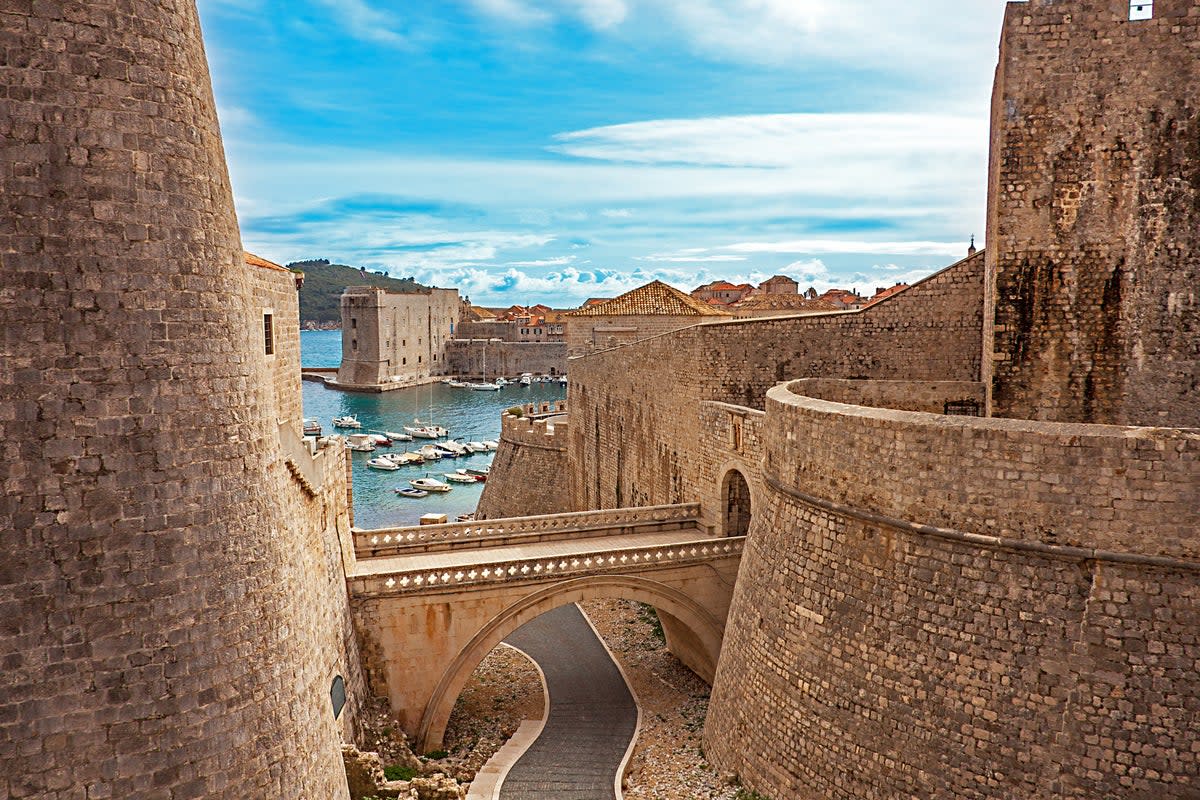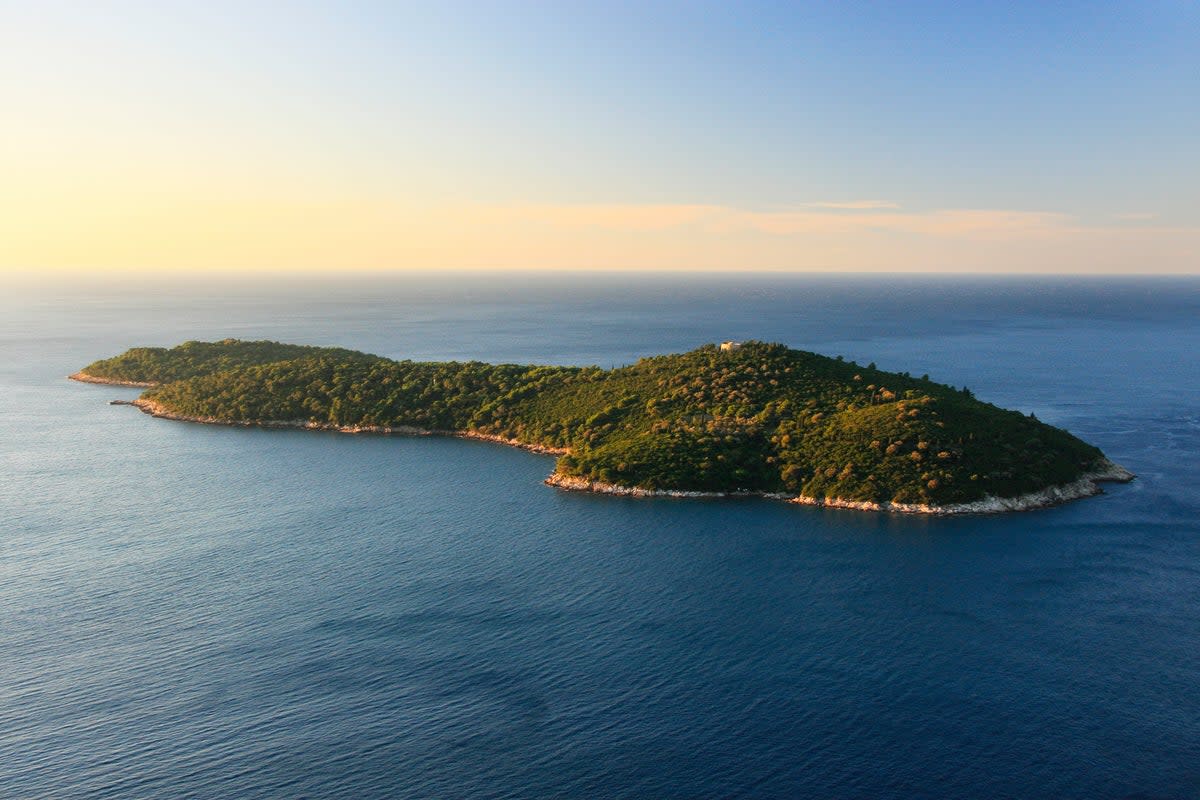
All lantern-lit limestone alleys, pealing bell towers and russet rooftops, ancient Dubrovnik remains a show-stopper. But if it were a show, the tickets would be perennially sold out – from May to September, you’ll find yourself jostling through crowds along its beautiful Stradun (the main promenade, in ivory-white limestone) and towering city walls. Consider going off-season for a more mellow introduction: up to mid-April and past late September is safest, though you may want to head there in warmer months to make the most of its pretty shingle beaches.
The walled old town – parts of it dating back to the early 14th century – is framed by cascading green coastline, with cypress and olive trees, stone cottages and sea-view restaurants to take in along the way. And remember: pack your comfiest trainers or sandals for this city of steep steps and dramatic slopes. Nearby are two more modern suburbs you can stay in, plus ample ferries onward to Dalmatia’s pretty islands. But first, your city checklist: here are the highlights.
Do
City walls
Dubrovnik’s number one sight is visible from the ground, but a whole different world opens up once you climb the (considerable) steps to the top. There are 1,940 metres of these immaculately preserved city walls, dating back to various parts of the 12th-17th centuries, which rise to around 25 metres at their tallest.
Read more on Croatia travel:
Stroll the bridge-like tops and climb several taller forts to get a blustery, 360-degree view of the city and coastline. Many visitors cluster at the western corner to see Lovrijenac Fort, which played the part of Red Keep in King’s Landing in TV series Game of Thrones, but there’s also a cute cafe on the sea-facing portion. It’s worth waiting for a clear day for this one – once you buy a ticket (which gets you onto the walls, into the Foundry Museum and Lovrijenac Fort), you can use it within three days.
Adults €35 (£30)/children 7+ €15 (£13); dpds.hr
Srd cable car

More dazzling views. Use a clear afternoon to glide smoothly up the Srd hillside on this 30-person cable car. Going at golden hour is most soothing, to see the sunlight dance on the Adriatic as you rise above an ant-sized Old City. It costs a bit, but you can take a breather at the top with a viewing platform, restaurant and shop with refreshments. The cable car does close in bad weather, so check it’s running before you hike up the many steps to its ticket booth.
Adults €27 (£23.50)/children €7 (£6) return; dubrovnikcablecar.com
Lokrum
You’ll see this forested hump of an island, just offshore, when sightseeing around town. It makes for an invigorating half-day or day trip – the perfect escape when the centre gets too crowded. If you like walking through pines, spotting peacocks among ruins and swimming off craggy bays, you could while away hours here. If it’s warm enough, take a dip in the island’s “Dead Sea”, an emerald natural pool, and walk up to the 19th-century French fort at the highest point. Boats leave from the Old Town harbour, and tickets can be bought at the tourism office just under the clock tower at the eastern end of the Stradun. The more adventurous kayak across – you can hire boats from Kolorina Bay, between Pile Gate and Lovrinjac.
The Franciscan Monastery and Rector’s Palace
The historic centre is a joy to wander, whether you’re a Medieval history nut or a budding Instagram star (just check the steps in every alley for people posing). There are so many little flourishes that a guide or walking tour can unlock for you – search the local Tour Guides’ Association for the most trusted. Going under your own steam, don’t miss the Franciscan Monastery and Rector’s Palace. The monastery survived Dubrovnik’s major earthquake of 1667, along with the gorgeous nearby Large Onofrio Fountain. It also has a true curiosity: the world’s oldest continually operating apothecary, which opened in 1317 (and is free to enter). The Rector’s Palace Museum is great for a general overview of local history, from aristocrat’s painted sedan chairs to eerie prison cells and the original keys to the city gates.
Monastery: Adults €4 (£3.50)/children €2 (£1.75); Palace: Adults €15 (£13)/children €8 (£7); dumus.hr

Stay
St Joseph’s
If you want to stay in the Old Town – the most beautiful area but also most crowded – this 16th-century house turned boutique hotel is the place. Spacious, stone-clad rooms have tasteful cream and grey decor to retain its antique feel, most with sofas, tables and kitchenettes – great for families who need a fridge and microwave. There’s no restaurant but a generous breakfast of cooked options, fruit and pastries can be delivered to your room.
Doubles from £208; stjosephs.hr
Hotel Bellevue
If you want a holiday feel with your city break, this cliffside five-star nails it, with bird’s-eye views of a pretty shingle beach – and a handy lift down to it. There’s a bijou spa, indoor pool and hot tub, a swanky fine-dining restaurant and smart, white-and-grey rooms with a beach house vibe. It’s a short walk out of the historic centre, enough to provide a bit of sanctuary away from the tour groups.
Doubles from £138; adriaticluxuryhotels.com
Hotel Excelsior
On the other side of the Old City, a five-minute walk from a great beach and the city gates is this grand old diva, which hosted Queen Elizabeth I and Elizabeth Taylor on visits to Dubrovnik. A huge indoor pool and spa area leads to a wave-lashed outdoor deck and a much-photographed tidal pool, all with a cracking view of the old town. Stop by the piano bar and cave-like Prora restaurant for a romantic trip to the past.
Doubles from £156; adriaticluxuryhotels.com
Hotel Porto
If you’re catching a ferry onward to the islands, it’s efficient to stay at this Gruz harbour four-star, a 30-minute walk or 10-minute bus from the Old City. It may be on a main road, but its smart modern-monochrome rooms and comfy terrace put you an unfrazzled five-minute stroll from the harbour’s boats.
Doubles from £90; hotelporto.hr
Eat
Holy Burek
Croatia’s bakeries are a godsend for a bite on the go. Stop by Holy Burek for a paper bag of the cheese or spinach filo pastry wonder burek, great for taking on to the beach or while dangling your legs off a harbour wall. facebook.com/holyburek
Barba
This no-reservations joint off the Stradun is a great informal stop for platters of whitebait, fish goujons and paper cones of calamari. It’s usually packed, but you could always grab a takeaway dish and perch on the steps outside. One of the few no-frills diners in the centre that isn’t a basic pizzeria. facebook.com/dubrovnik.barba
Proto Fish Restaurant
If you want this city’s high-end seafood – oysters, lobster and so on – make for this renowned Old City restaurant along a pretty limestone alley. Sitting along the pavement is atmospheric day or night, but there’s also a hidden roof terrace which is incredibly romantic (ask staff if there’s room). esculaprestaurants.com
Portun
Elegant alleyway bistros are dime a dozen here in the old city, but they’re not all winners. This family-run option off the Stradun is friendly, with a reasonably priced and accessible menu. Portions aren’t huge, but they’re beautifully presented – one for a stylish last night dinner. portun-dubrovnik.com
Restaurant Arsenal
This grand dame cafe does all the Dalmatian classics – such as black cuttlefish risotto, garlicky mussels buzara, and fish stew – with flair, and pairs them with friendly service. You’ll likely spot the Stradun-facing patio first, but walk through the inside to find the lovely rear terrace, with arches framing the gorgeous Old Harbour. Book ahead in high season. nautikarestaurants.com
Drink
Buzz Bar
There are lots of touristy cafes for sitting outside with a beer and fabulous architecture all around you, but this side-alley hangout is where the locals go. You’ll hear rock classics playing and see middle-aged blokes watching sport on TV. The only catch? Smoking is allowed inside – strangely quaint, but perhaps go for an outdoor table. thebuzzbar.wixsite.com
Buža I and II
Set into the city walls and across the rocks below them, these outdoor watering holes are a hit with view-chasers and Instagrammers alike at sunset. Though no longer a secret, they’re worth the hype, with casual drinks like bottled beers and wine served in plastic cups – bar I is marked as “Bard Mala Buža” on Google Maps, while II is “Buža Bar”. buzabar.com
Shop
The local, natural produce in Croatia makes for the best take-home gifts: think olive oil, wine, honey, herbs and spices. On Sundays, there’s a farmer’s market on GunduliÄeva Poljana Square, where you can buy direct from suppliers. On other days, try Uje or Note Bene.
Whatever the time of year, this deeply Catholic, artisan-stacked region is a great place to pick up unique Christmas decorations. You’ll find traditional hanging decs that resemble iced biscuits in most gift shops here, and there’s a festively camp Christmas Shop open year round.
For something more soulful, chat with the family owners of BaÄan, a traditional embroidery workshop that was started by Lena’s mother 50 years ago, and is carried on by her today. Colourful, immaculately stitched patterns adorn table runners, coasters, tote bags and child-sized traditional tunics. You’ll find it on Prijeko ulica 6, close to Buzz Bar.
Get a sense of modern Croatia at Life According to Kawa, a concept store close to the Old City’s eastern (Ploce) gate. Stylish ceramics and candles join hipster T-shirts and sunglasses, local food products and cult Croatian sweets.

Architectural highlight
The Old Town as a whole more than earns its Unesco status, but seek out the Large Onofrio’s Fountain for a good look, ideally when the city’s quiet. Though built in the 1430s, it looks good as new with its chiselled faces and spouts still spilling drinking water, transported by aqueduct from the River Ombla.
FAQs
What currency do I need?
Euros. Croatia joined the European currency in January 2023.
What language do they speak?
Croatian, though most also speak great English. Attempting a friendly dobar dan (good afternoon), hvala (thank you) or bok (hi) goes a long way.
Should I tip?
Yes, although it’s not strict. Most restaurants don’t add a service charge to the bill, and you usually have to tip in cash; 10-15 per cent is sufficient.
How should I get around?
The historic centre and nearby Banje Beach are all walkable, and will take you two or three days to cover. For a break from the busiest bit, take the cheap city buses that run out to Gruz Harbour, Lapad (where many of the hotels are), oyster hotspot Ston, and the nearby coastal town of Cavtat. A single journey is €2 (£1.75) and you can pay onboard, or buy a multi-ticket at a bus stop kiosk. The number of clueless tourists here means taxis often give insanely high quotes, so insist on using a meter. More info can be found here.
What’s the best view?
The Lovrijenac (St Lawrence) Fort, to the west of the city walls, is worth the knee-aching climb. It sits above two pretty bays, which sparkle and fizz on a bright day, and has glorious views back on the walled city. Walk all the way to the top, and don’t forget to ascend the final staircase to the tip-top terrace (easily missed). It’s included in your city walls ticket, so hang on to that even if you’re going separately.
Insider tip
Coach groups and day-trippers tend to descend on the Old City around 9.30 or 10am, so get to the walls at 8am sharp if they’re open that early (hours change with the seasons). You’re in with a chance of a breathtakingly empty, peaceful walk around this majestic trail – something that turns into a patient shuffle later on.
Getting there
Trying to fly less?
You can get all the way from London to Dubrovnik by train, bus and ferry. Try the London to Paris Eurostar, then a train from Paris Est to Karlsruhe, Germany, then a bus down to Split, Croatia. From here you can take a ferry to Dubrovnik.
Fine with flying?
Jet2, easyJet and Ryanair all fly direct from the UK to Dubrovnik.
For more information, visit visitdubrovnik.hr and croatia.hr
Read more on the best Croatia hotels
Originally published
